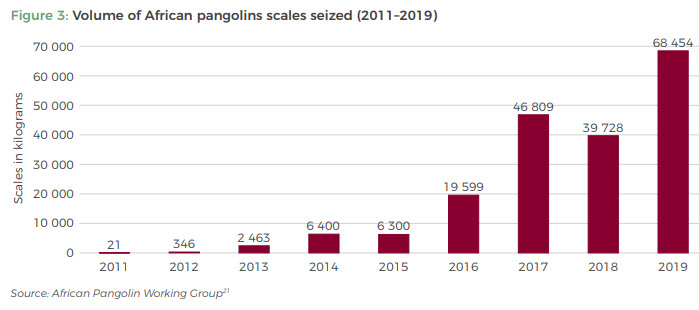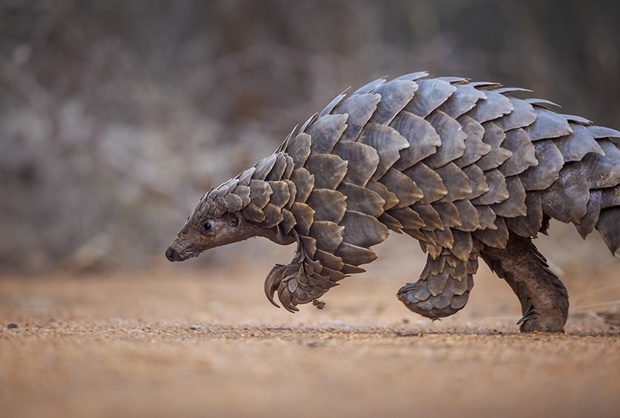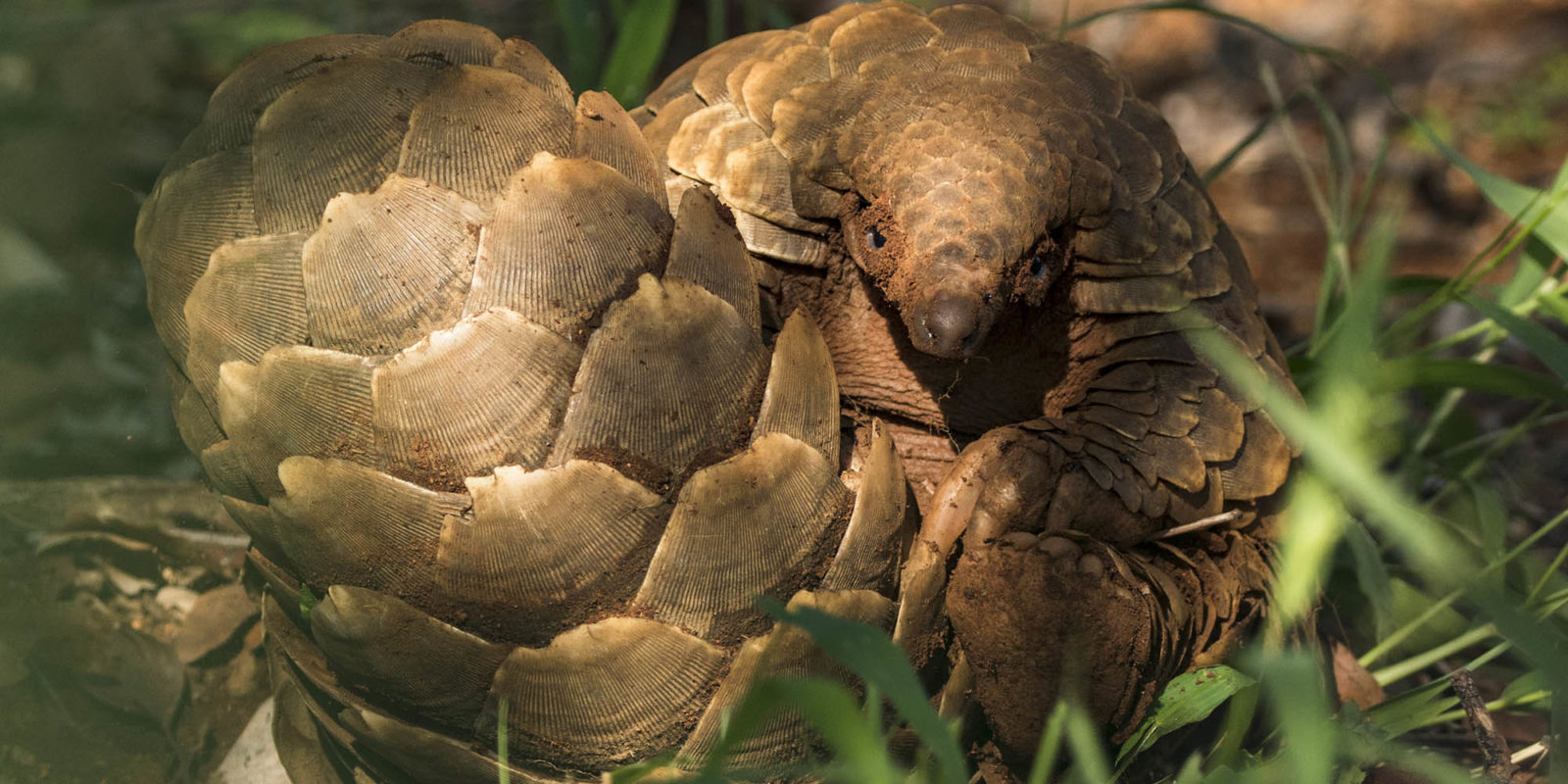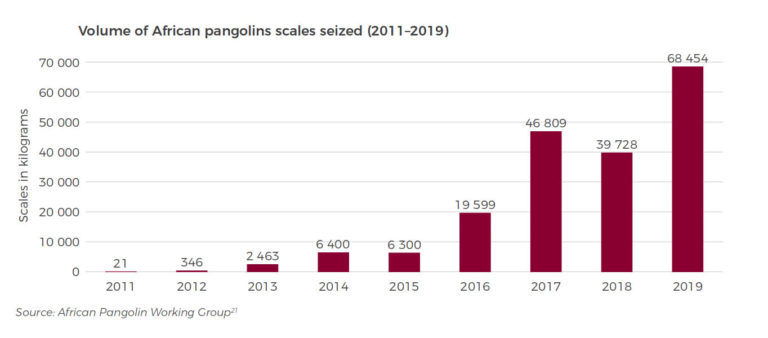Threats to Pangolins & Pangolin Conservation
- Lisbeth
- Site Admin
- Posts: 67388
- Joined: Sat May 19, 2012 12:31 pm
- Country: Switzerland
- Location: Lugano
- Contact:
Re: Pangolin Poaching
"Education is the most powerful weapon which you can use to change the world." Nelson Mandela
The desire for equality must never exceed the demands of knowledge
The desire for equality must never exceed the demands of knowledge
- RogerFraser
- Site Admin
- Posts: 6003
- Joined: Wed Sep 18, 2013 9:36 pm
- Country: South Africa
- Location: Durban
- Contact:
- Alf
- Posts: 11606
- Joined: Wed Nov 26, 2014 12:40 pm
- Country: south africa
- Location: centurion
- Contact:
Re: Pangolin Poaching
Poor animal 
Great work though
Great work though
Next trip to the bush??
Let me think......................
Let me think......................
-
Klipspringer
- Global Moderator
- Posts: 5862
- Joined: Sat Sep 14, 2013 12:34 pm
- Country: Germany
- Contact:
Re: Pangolin Poaching
https://www.maritime-executive.com/arti ... increasing
Report: Pangolin Exports from South Africa Increasing
BY THE MARITIME EXECUTIVE 2019-11-06 18:16:59
South Africa and neighboring states must act urgently to save what is already the world’s most smuggled mammal, according to a new report. The conservation NGO WildAid estimates that 100,000 pangolins are taken from the wild each year in Africa and Asia. Scales from more than a million pangolins have been traded globally in the past decade, with seizures by law enforcement surging from 21kg in 2011 to more than 68,000kg in 2019.
The decline in Asian pangolins has now seen organized criminal networks turning their attention to African species. The illegal trade has steadily moved south with gangs using South Africa to export animal products from across Africa, aided by good transport infrastructure and border controls eroded by corruption.

Profits from the illicit trade help finance terrorism, while smugglers are linked to criminal syndicates who also traffic people, guns and drugs, says Richard Chelin, author and Researcher at the ENACT organized crime program at the Institute for Security Studies (ISS). ENACT is funded by the E.U. and implemented by the ISS, INTERPOL and the Global Initiative against Transnational Organised Crime.
Strategies to combat illegal wildlife trafficking focus on iconic species such as rhino and elephant at the expense of lesser-known animals, Chelin said. The illicit harvest and trafficking of pangolins is not the prime focus of any specific South African government plan.
“We have to act now,” he says. “It is vital that we understand and prevent the illicit trade in pangolins before it is too late. The threat to the rhino shows that early interventions are better than reactive measures at the height of a crisis.”
In parts of Asia, pangolin meat is consumed as a symbol of wealth, and the scales and blood are used in traditional medicine.
Southern Africa is the last region with a reasonably healthy pangolin population. But the local species of Temminck’s ground pangolin is now extremely vulnerable. Failure to take decisive and coordinated action could see it become extinct in the wild in two decades.
Frontline government conservationists say bigger fines and longer sentences would help to protect endangered wildlife. Provincial legislation, such as the Gauteng Nature Conservation Ordinance of 1983, is outdated and not aligned with the National Environmental Management Biodiversity Act (NEMBA).
In the Gauteng legislation the fine for hunting a pangolin ranges from just R1 500 – R2,000, with prison sentences between 18 – 24 months. By contrast, the penalty for hunting an elephant or a rhino is a fine of R100,000, 10 years in prison or both. NEMBA allows for a maximum prison sentence of 10 years and a fine of R10 million.
“A small fine or a few days in jail is not a deterrent for organized criminals in a high-value industry,” says Fanie Masango, a specialised biodiversity officer and environmental management inspector working for Gauteng’s Green Scorpions. “The poachers are laughing at us.”
He says prosecutors, judges and magistrates need educating on the severity of wildlife crime and its impact and should be encouraged to impose hefty sentences. Masango also called for better coordination between crime intelligence, police, the Hawks and conservation officers, with standard operating procedures to ensure they share intelligence and work together.
Global agreements to combat the illegal trade in pangolins and other wildlife include the Convention on International Trade in Endangered Species (CITES), the UN Convention against Corruption and the UN Convention against Transnational Organized Crime. The African Union and the Southern African Development Community have strategies to combat illegal wildlife trade, but implementation lacks funding and is not coordinated across borders.
Professor Ray Jansen, founder and chair of the African Pangolin Working Group says the pangolin is at risk of extinction in 20 years at the current rate of poaching and trade. He proposes a “chiefs and children” strategy that would see government and conservationists working with traditional leaders to protect pangolins and with schools to raise awareness of the value of wildlife to future generations.
The report is available here: https://enact-africa.s3.amazonaws.com/s ... PB12-2.pdf
Report: Pangolin Exports from South Africa Increasing
BY THE MARITIME EXECUTIVE 2019-11-06 18:16:59
South Africa and neighboring states must act urgently to save what is already the world’s most smuggled mammal, according to a new report. The conservation NGO WildAid estimates that 100,000 pangolins are taken from the wild each year in Africa and Asia. Scales from more than a million pangolins have been traded globally in the past decade, with seizures by law enforcement surging from 21kg in 2011 to more than 68,000kg in 2019.
The decline in Asian pangolins has now seen organized criminal networks turning their attention to African species. The illegal trade has steadily moved south with gangs using South Africa to export animal products from across Africa, aided by good transport infrastructure and border controls eroded by corruption.

Profits from the illicit trade help finance terrorism, while smugglers are linked to criminal syndicates who also traffic people, guns and drugs, says Richard Chelin, author and Researcher at the ENACT organized crime program at the Institute for Security Studies (ISS). ENACT is funded by the E.U. and implemented by the ISS, INTERPOL and the Global Initiative against Transnational Organised Crime.
Strategies to combat illegal wildlife trafficking focus on iconic species such as rhino and elephant at the expense of lesser-known animals, Chelin said. The illicit harvest and trafficking of pangolins is not the prime focus of any specific South African government plan.
“We have to act now,” he says. “It is vital that we understand and prevent the illicit trade in pangolins before it is too late. The threat to the rhino shows that early interventions are better than reactive measures at the height of a crisis.”
In parts of Asia, pangolin meat is consumed as a symbol of wealth, and the scales and blood are used in traditional medicine.
Southern Africa is the last region with a reasonably healthy pangolin population. But the local species of Temminck’s ground pangolin is now extremely vulnerable. Failure to take decisive and coordinated action could see it become extinct in the wild in two decades.
Frontline government conservationists say bigger fines and longer sentences would help to protect endangered wildlife. Provincial legislation, such as the Gauteng Nature Conservation Ordinance of 1983, is outdated and not aligned with the National Environmental Management Biodiversity Act (NEMBA).
In the Gauteng legislation the fine for hunting a pangolin ranges from just R1 500 – R2,000, with prison sentences between 18 – 24 months. By contrast, the penalty for hunting an elephant or a rhino is a fine of R100,000, 10 years in prison or both. NEMBA allows for a maximum prison sentence of 10 years and a fine of R10 million.
“A small fine or a few days in jail is not a deterrent for organized criminals in a high-value industry,” says Fanie Masango, a specialised biodiversity officer and environmental management inspector working for Gauteng’s Green Scorpions. “The poachers are laughing at us.”
He says prosecutors, judges and magistrates need educating on the severity of wildlife crime and its impact and should be encouraged to impose hefty sentences. Masango also called for better coordination between crime intelligence, police, the Hawks and conservation officers, with standard operating procedures to ensure they share intelligence and work together.
Global agreements to combat the illegal trade in pangolins and other wildlife include the Convention on International Trade in Endangered Species (CITES), the UN Convention against Corruption and the UN Convention against Transnational Organized Crime. The African Union and the Southern African Development Community have strategies to combat illegal wildlife trade, but implementation lacks funding and is not coordinated across borders.
Professor Ray Jansen, founder and chair of the African Pangolin Working Group says the pangolin is at risk of extinction in 20 years at the current rate of poaching and trade. He proposes a “chiefs and children” strategy that would see government and conservationists working with traditional leaders to protect pangolins and with schools to raise awareness of the value of wildlife to future generations.
The report is available here: https://enact-africa.s3.amazonaws.com/s ... PB12-2.pdf
- Richprins
- Committee Member
- Posts: 75964
- Joined: Sat May 19, 2012 3:52 pm
- Location: NELSPRUIT
- Contact:
Re: Pangolin Poaching
Please check Needs Attention pre-booking: https://africawild-forum.com/viewtopic.php?f=322&t=596
- Lisbeth
- Site Admin
- Posts: 67388
- Joined: Sat May 19, 2012 12:31 pm
- Country: Switzerland
- Location: Lugano
- Contact:
Re: Pangolin Poaching
Good article, underlining the fact that there is too much corruption and that the state is only trying to curb in the poaching of the more iconic animals, because they are under the limelight of the world's attention, not because they care about the heritage of the past and the war should include ALL endangered species 

"Education is the most powerful weapon which you can use to change the world." Nelson Mandela
The desire for equality must never exceed the demands of knowledge
The desire for equality must never exceed the demands of knowledge
- Lisbeth
- Site Admin
- Posts: 67388
- Joined: Sat May 19, 2012 12:31 pm
- Country: Switzerland
- Location: Lugano
- Contact:
Re: Threats to Pangolins

Pangolins threatened by criminal networks in southern Africa
2019-11-08 12:25 | AFP
Pangolins are under threat from illegal trafficking networks, conservationists said on Wednesday, as they urged southern African countries to step up protection of one of the world's most smuggled mammals.
Around 100 000 pangolins are plucked from the wild each year in Africa and Asia, according to conservation group WildAid.
The flesh of these endangered scaled mammals is considered a delicacy in China and Vietnam, where their bones and blood are also used for traditional medicine.
Demand for pangolin scales exploded over the past decade, with seizures rising from 21 kilogrammes in 2011 (£56) to 68 000 kilogrammes this year, says WildAid.
That trade became illegal when pangolins were placed under full protection from international trade by the wild fauna and flora CITES convention in 2016.
But an EU-funded research project has found that criminal gangs have since tapped into the industry.
"It is vital that we understand and prevent the illicit trade in pangolins before it is too late," said researcher Richard Chelin in a statement on Wednesday.
He added that strategies to combat illegal wildlife trafficking had focused mainly on iconic species such as elephants and rhinos, at the expense of lesser-known animals such as pangolins.
"The threat to the rhino shows that early interventions are better than reactive measures at the height of a crisis," said Chelin.
Southern Africa remains the only region with a reasonably healthy pangolin population.
Conservationists are lobbying the government to do more to protect the species.
"A small fine or a few days in jail is not a deterrent for organised criminals in a high-value industry," said South Africa environmental inspector Fanie Masango.
While hunting elephant and rhino in South Africa can lead to a R100 000 fine and a ten-year prison sentence, a pangolin hunter can get away with R1 500.
"Education is the most powerful weapon which you can use to change the world." Nelson Mandela
The desire for equality must never exceed the demands of knowledge
The desire for equality must never exceed the demands of knowledge
- Lisbeth
- Site Admin
- Posts: 67388
- Joined: Sat May 19, 2012 12:31 pm
- Country: Switzerland
- Location: Lugano
- Contact:
Re: Threats to Pangolins

A Temminck’s ground pangolin, found primarily in sub-Saharan and southern Africa, is often sold alive. (Photo: Francois Meyer)
A policy document has been released that assesses gaps in the strategies and policies used to protect the most trafficked mammal in the world — the pangolin.
“A question of scales”, a report compiled by Richard Chelin for ENACT (Enhancing Africa’s response to transnational organised crime), emphasises the need for urgent action to protect the animal known as the scaly anteater.
Pangolins are the most trafficked mammal in the world. Markets in Asia have a voracious appetite for the solitary creatures and after decimating the Asian population, African numbers are decreasing at alarming rates.
On the African continent, pangolins are primarily consumed as bush meat, or used in traditional medicines, but in the past few years the number of animals leaving the country has skyrocketed. They are sold alive as delicacies or killed for their scales. Pangolin scales are used to treat a number of illnesses in both Asia and Africa, and this year alone almost 70,000kg of scales have left the continent.

Presenting his policy document at the Institute of Security Studies in Pretoria on Wednesday 6 November 2019, Chelin argued that the illegal trade in pangolins, both living animals and animal body parts, should no longer be perceived as purely an environmental problem. Rather, ENACT believes the trade in pangolins should be considered a significant form of transnational organised crime.
According to the brief, “each pangolin that is trafficked across a border compromises the integrity of law enforcement and border agencies”.
In southern Africa, there is a large amount of cross-border trafficking and trading of poached animals, particularly between Zimbabwe and South Africa. Both countries have strict laws on pangolin poaching. However, Zimbabwean poachers trying to sell the animal in their home country would often receive harsh sentences if caught, whereas South African pangolin poaching cases rarely resulted in punitive sentencing.
This is slowly changing. In September 2019 32-year-old Vincent Nyathi received the harshest sentence to date for pangolin poaching. Nyathi will spend the next eight years behind bars after he was found in possession of a live pangolin in 2018.
Under the National Environmental Management: Biodiversity Act (NEMBA), Nyathi could have spent 10 years in prison, paid a fine of R10-million or done the time and paid the fine.
The problems lie not with the policies, but with the implementation of policies such as NEMBA, according to Fanie Masango, a speaker at Wednesday’s policy brief launch. Masango is one of seven Environmental Management Inspectors, also known as green scorpions, working in Gauteng. In terms of South African policy, Masango believes the country is on the right track.
“NEMBA is watertight and airtight when it comes to the protection of pangolins. The penalties are clear; the only problem is the application of the act. We need to give people the maximum sentences, to give people the 10 years, not just a few thousand rand fine. That would send a harsh message,” Masango told Daily Maverick.
Masango also spoke on issues around legal grey areas. Talking to Daily Maverick, the green scorpion stated that the vast majority of his pangolin- related cases involved immigrants, and primarily immigrants without documentation. Masango has had incidents in which he tracks poachers and arrests them, only for them to make bail and skip the country.
Masango wants to see these issues tightened up because at the moment, “the poachers are laughing at us”.
“A question of scales” calls for the creation and implementation of a strategy aimed specifically at protecting pangolins, to ensure the animals are not trafficked within South Africa and across the border.
Professor Ray Jansen of the African Pangolin Working Group (APWG), is doing just that. For the past five years, Jansen and his small team have been working hard to get all the relevant roleplayers on board to help conserve and protect the critically endangered mammal.
Parliament is in the last stage of signing a standard operating procedure for pangolin recovery, developed by the African Pangolin Working Group. It will be the first official document to focus solely on pangolin protection.
“Now, as soon as I retrieve a pangolin from the trade, the very first thing I do when it’s still in my arms is I phone the government,” Jansen told Daily Maverick.
The National Prosecuting Authority, the SAPS and the Department of Environmental Affairs all work together to create a single docket after Jansen and the African Pangolin Working Group pull an animal out of the illegal wildlife trade.
But despite the improvements in communication between branches of government, there are still issues. At the release of the 2018/19 crime statistics in September 2019, the last few slides mentioned environmental crimes. According to Jansen, the statistics on pangolin poaching were far from correct.
.............. April 2017 – March 2018....April 2018 – March 2019...Case difference
SAPS data ..............16............................. 28.....................12
APWG data..............28.............................37.......................9
In 2019 alone the group has rescued 29 pangolins, 10 of which were removed from the illicit trade in rural Limpopo in the past five weeks. In comparison, Masango only dealt with one pangolin-related case in 2015. In the subsequent four years, the number of pangolin cases he has been called to assist on has significantly increased.
Although he has the authority to arrest people for committing environmental crimes, Masango does not have a blue light, nor is he permitted to carry a firearm. So while the law is on his side, it can be difficult for him to enact the law.
This is not just the case for Masango. As a continent, the African Strategy on Combating Illegal Exploitation and Illegal Trade in Wild Fauna and Flora in Africa was adopted in 2014. According to Chilen, little progress has been made to implement the strategy. One of its core aspects involved the development of databases and monitoring systems on the trade of illegal fauna and flora, but no tools have been developed.
As Masango said, the policies are not the primary problem. Rather, it is the lack of education on the policies and dismal implementation that is killing African pangolin.
"Education is the most powerful weapon which you can use to change the world." Nelson Mandela
The desire for equality must never exceed the demands of knowledge
The desire for equality must never exceed the demands of knowledge
- Richprins
- Committee Member
- Posts: 75964
- Joined: Sat May 19, 2012 3:52 pm
- Location: NELSPRUIT
- Contact:
Re: Pangolin Poaching
Claws removed while Alive



Dead pangolin highlights reality of poaching crisis
The Johannesburg Wildlife Veterinary Hospital (JWVH) team have been trying to save a live pangolin which has been a victim of poaching by international sting operations. If they did, he could be returned to the wild.
4 hours ago
During August, news of a poached pangolin reached the team at the Johannesburg Wildlife Veterinary Hospital (JWVH). While the rescue of live pangolins during sting operations is nothing new, this case was different. Although the animal was alive, poachers had sealed its fate by removing its claws.
The JWVH team tried their best to save the animal in the hope that his claws would grow back – if they did, he could be returned to the wild – but to no avail.
Pangolins are taken from the wild as their scales are used in many traditional medicines, and they are also seen as a delicacy. The demand on the African continent has increased as pangolins in Asia have been subject to poaching for much longer.
Poaching pangolins from the wild is mostly orchestrated by international syndicates.
Read more about the plight of this pangolin and other interesting conservation stories in the latest Safari News.
https://lowvelder.co.za/512931/dead-pan ... ng-crisis/
Dead pangolin highlights reality of poaching crisis
The Johannesburg Wildlife Veterinary Hospital (JWVH) team have been trying to save a live pangolin which has been a victim of poaching by international sting operations. If they did, he could be returned to the wild.
4 hours ago
During August, news of a poached pangolin reached the team at the Johannesburg Wildlife Veterinary Hospital (JWVH). While the rescue of live pangolins during sting operations is nothing new, this case was different. Although the animal was alive, poachers had sealed its fate by removing its claws.
The JWVH team tried their best to save the animal in the hope that his claws would grow back – if they did, he could be returned to the wild – but to no avail.
Pangolins are taken from the wild as their scales are used in many traditional medicines, and they are also seen as a delicacy. The demand on the African continent has increased as pangolins in Asia have been subject to poaching for much longer.
Poaching pangolins from the wild is mostly orchestrated by international syndicates.
Read more about the plight of this pangolin and other interesting conservation stories in the latest Safari News.
https://lowvelder.co.za/512931/dead-pan ... ng-crisis/
Please check Needs Attention pre-booking: https://africawild-forum.com/viewtopic.php?f=322&t=596


